Western North Carolina and its foothills are known for its natural beauty, open spaces, farmlands, and smokey mountains. However, these natural areas have recently been affected by people moving to rural areas and growing development. The loss of wilderness and culturally significant structures and places has in turn hurt the North Carolina state economy. For private landowners, there is a way that you can help preserve these natural areas for future generations.
A conservation easement is an effective way to conserve natural and historical entities while maintaining your private ownership of the property.
What is a Conservative Easement?
A conservation easement is a voluntary, legal agreement made between a landowner and a qualified conservation preservation organization to protect the conservation of natural resources of a property by limiting the use of the property. In a nutshell, a landowner promises to keep parts or the entirety of his or her property undeveloped or natural to preserve the land’s history or natural elements for the future. The public organization that holds the conservation easement has the right to monitor the property to ensure that future owners or others comply with the terms of the easement.
What Does a Conservation Easement Look Like?
Not all conservation easements look the same but instead are tailored to meet the needs and wishes of the landowner and work to best protect the natural and cultural attributes of that property. For example, an average conservation easement may:
- Limit amount of additional structures that can be built on the property,
- Prohibit heavy commercial development,
- Allow for restoration of native forests, or other ecosystems,
- Specify a timber plan for continued farming or timber cutting of the property,
- Designate areas of the property to remain forever wild.
Agricultural conservation easements are often used to protect the value or productivity of farmland from the threat of urbanization. In WNC, conservation easements have recently been used to protect the scenic beauty of the Blue Ridge Parkway among other natural areas.
Benefits of Choosing to Add a Conservation Easement to Your Property?
Fortunately, if the landowner chooses, a conservation easement added to the property can permanently preserve the land and its resources. A landowner will likely have to pay some expenses such as for a land survey, appraisal, and other fees in creating the easement. However, to some qualifying owners, having a conservation easement can serve as a tax deduction.
Ultimately, conservation easements have emerged as an effective way to preserve natural spaces and forests from the pressures of development and urbanization. Similarly, conservation easements are a great way for local private landowners to act to conserve the beauty of Western North Carolina.
If you are interested in taking the steps to preserve your land through a conservation easement, at King Law, there are attorneys throughout North and South Carolina who handle these types of cases and can represent you in this special situation. Call our toll-free number at 888-748-KING (5464) to request a consultation with one of these experienced attorneys.

